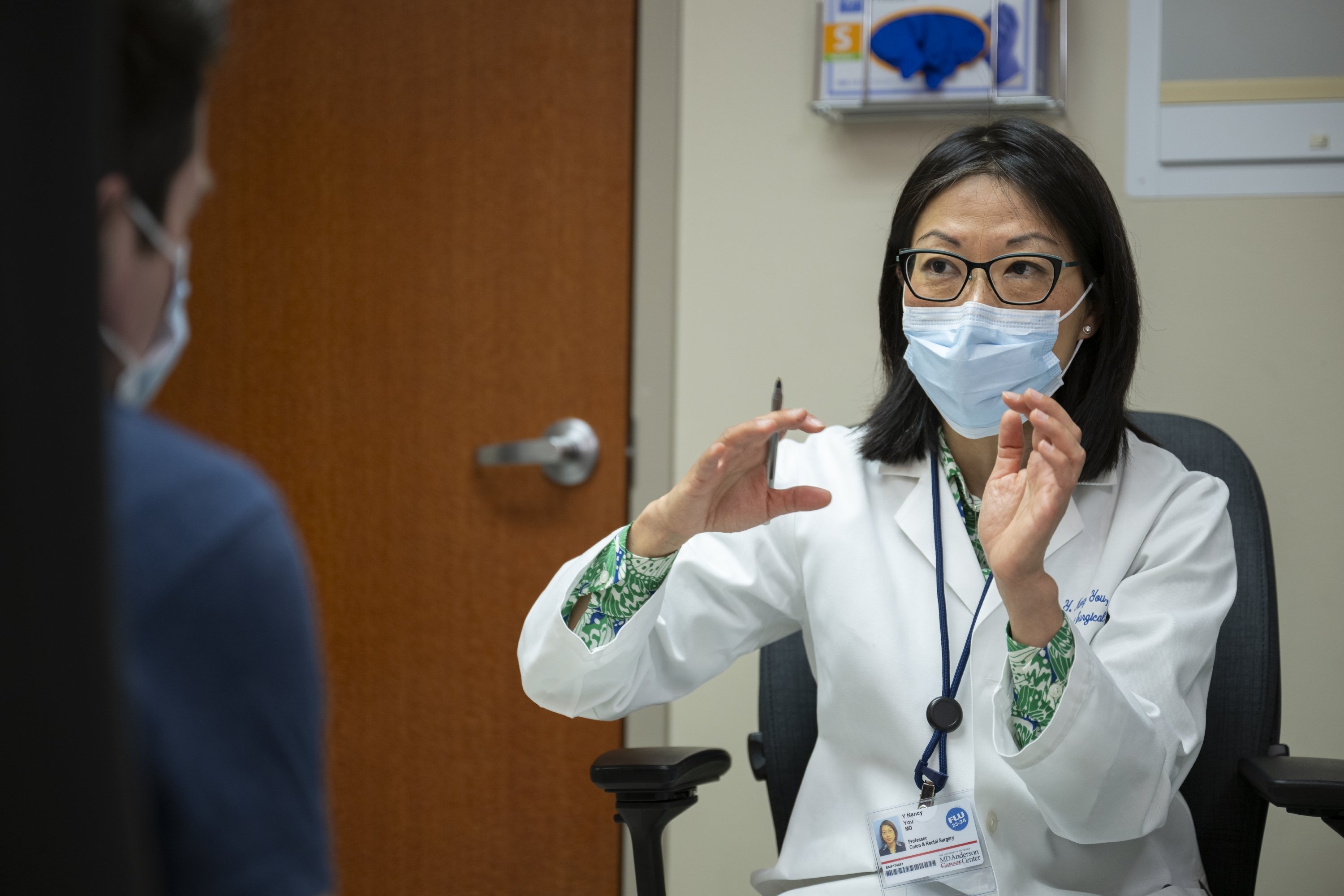- Diseases
- Acoustic Neuroma (14)
- Adrenal Gland Tumor (24)
- Anal Cancer (68)
- Anemia (2)
- Appendix Cancer (16)
- Bile Duct Cancer (26)
- Bladder Cancer (72)
- Brain Metastases (28)
- Brain Tumor (232)
- Breast Cancer (714)
- Breast Implant-Associated Anaplastic Large Cell Lymphoma (2)
- Cancer of Unknown Primary (4)
- Carcinoid Tumor (8)
- Cervical Cancer (158)
- Colon Cancer (166)
- Colorectal Cancer (116)
- Endocrine Tumor (4)
- Esophageal Cancer (44)
- Eye Cancer (36)
- Fallopian Tube Cancer (8)
- Germ Cell Tumor (4)
- Gestational Trophoblastic Disease (2)
- Head and Neck Cancer (12)
- Kidney Cancer (128)
- Leukemia (342)
- Liver Cancer (50)
- Lung Cancer (286)
- Lymphoma (278)
- Mesothelioma (14)
- Metastasis (30)
- Multiple Myeloma (100)
- Myelodysplastic Syndrome (60)
- Myeloproliferative Neoplasm (4)
- Neuroendocrine Tumors (16)
- Oral Cancer (100)
- Ovarian Cancer (172)
- Pancreatic Cancer (160)
- Parathyroid Disease (2)
- Penile Cancer (14)
- Pituitary Tumor (6)
- Prostate Cancer (146)
- Rectal Cancer (58)
- Renal Medullary Carcinoma (6)
- Salivary Gland Cancer (14)
- Sarcoma (238)
- Skin Cancer (294)
- Skull Base Tumors (56)
- Spinal Tumor (12)
- Stomach Cancer (64)
- Testicular Cancer (28)
- Throat Cancer (92)
- Thymoma (6)
- Thyroid Cancer (96)
- Tonsil Cancer (30)
- Uterine Cancer (80)
- Vaginal Cancer (16)
- Vulvar Cancer (20)
- Cancer Topic
- Adolescent and Young Adult Cancer Issues (20)
- Advance Care Planning (10)
- Biostatistics (2)
- Blood Donation (18)
- Bone Health (8)
- COVID-19 (362)
- Cancer Recurrence (120)
- Childhood Cancer Issues (120)
- Clinical Trials (630)
- Complementary Integrative Medicine (22)
- Cytogenetics (2)
- DNA Methylation (4)
- Diagnosis (232)
- Epigenetics (6)
- Fertility (62)
- Follow-up Guidelines (2)
- Health Disparities (14)
- Hereditary Cancer Syndromes (126)
- Immunology (18)
- Li-Fraumeni Syndrome (8)
- Mental Health (116)
- Molecular Diagnostics (8)
- Pain Management (62)
- Palliative Care (8)
- Pathology (10)
- Physical Therapy (18)
- Pregnancy (18)
- Prevention (912)
- Research (392)
- Second Opinion (74)
- Sexuality (16)
- Side Effects (604)
- Sleep Disorders (10)
- Stem Cell Transplantation Cellular Therapy (216)
- Support (402)
- Survivorship (320)
- Symptoms (182)
- Treatment (1786)
How to detect colon cancer without a colonoscopy
3 minute read | Published April 27, 2023
Medically Reviewed | Last reviewed by an MD Anderson Cancer Center medical professional on April 27, 2023
Current screening guidelines suggest that everyone should get their first colonoscopy at age 45 if they are at average risk for colon cancer. But the bowel prep for a colonoscopy and having to take a day off deters many people from getting screened for colon cancer.
We spoke with gastroenterologist Robert Bresalier, M.D., about alternatives to a colonoscopy.
Other ways to screen for colon cancer
A colonoscopy is the gold standard test in the United States for colon cancer screening, but there are other tests available. Some of these include:
- Fecal immunochemical test (FIT): This is an inexpensive, at-home, stool-based test that looks for proteins found in the blood. Blood in the stool could be a sign of colon cancer, and a positive FIT test would signal that you need to get a colonoscopy. If you choose to do a FIT test instead of a colonoscopy, it’s recommended to get tested every year.
- Stool FIT/DNA test: This at-home test is a combination of FIT and looking at molecular changes, such as DNA mutations, in the stool. A positive test would signal that you need to get a colonoscopy. This test is recommended every three years.
“Stool-based tests are pretty good at detecting colon cancer, but not precancerous polyps,” says Bresalier. “Early cancer detection is important, and we want to pick it up as early as possible.”
- Virtual colonoscopy: This is a CT scan that generates a two-dimensional image, then computerized software generates three-dimensional images of your colon. Your doctor will look at these images, checking for polyps or other abnormalities.
Virtual colonoscopies require the same prep as a colonoscopy, and if your doctor finds anything during the virtual colonoscopy, you’ll need a colonoscopy. If you’re at average risk for colon cancer, MD Anderson recommends that you get your first virtual colonoscopy at age 45 and every five years after that if your initial test is negative.
Not all insurance providers will cover the cost of a virtual colonoscopy, though, so check with your provider before scheduling this test.
Watch out for these colon cancer symptoms
More young patients are being diagnosed with colon cancer today, so everyone should be on the lookout for symptoms of colon cancer regardless of age.
Bresalier said if you experience blood in your stool, abdominal pain or a change in bowel habits, see your doctor right away. These could be the first symptoms of colon cancer.
“The most common symptom of colon cancer is no symptom at all, until late-stage colon cancer,” says Bresalier.
That’s why it is so important to get screened so your doctor can look for and remove precancerous polyps.
Still, just 40% of all age-eligible individuals get screened for colon cancer, says Bresalier.
Screening is especially important for Black men and women, who have the highest rate of colon cancer among all races in the United States.
“Screening saves lives, and we have multiple options for screening,” says Bresalier. “The best test is the one that you’ll follow through with.”
More colon cancer screening options are on the horizon
There's a lot of interest in new testing options. MD Anderson has been involved with several programs to develop new non-invasive tests, including the National Cancer Institute’s Early Detection Research Network, which seeks to bring more alternative tests to patients.
“There’s a lot of interest in blood-based testing because it would be easy to do, relatively inexpensive and amenable to point-of-care testing,” says Bresalier.
The majority of studies are looking at alternative testing that involves multi-marker tests – that is, tests that involve multiple technologies, such as DNA and protein.
“The new push is to develop alternate tests that will detect not just one type of cancer, like colon cancer, but multiple types of cancer,” says Bresalier. “We’ve developed one at MD Anderson that we’ve licensed to a commercial enterprise, and we’re hoping it will come into clinical practice.”
Bresalier says stool-based tests for colon cancer are here to stay, and we can expect to see more alternative blood test options in the next five years.
Request an appointment at MD Anderson online or by calling 1-877-632-6789.
Related Cancerwise Stories

The best test is the one that you’ll follow through with.
Robert Bresalier, M.D.
Physician





